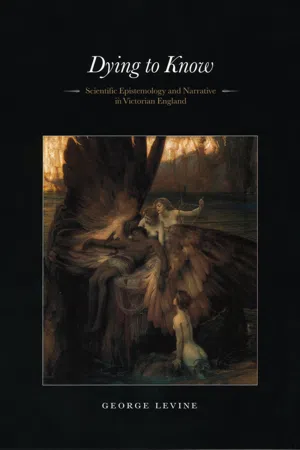
- English
- PDF
- Available on iOS & Android
eBook - PDF
About this book
"Dying to Know is the work of a distinguished scholar, at the peak of his powers, who is intimately familiar with his materials, and whose knowledge of Victorian fiction and scientific thought is remarkable. This elegant and evocative look at the move toward objectivity first pioneered by Descartes sheds new light on some old and still perplexing problems in modern science." Bernard Lightman, York University, Canada
In Dying to Know, eminent critic George Levine makes a landmark contribution to the history and theory of scientific knowledge. This long-awaited book explores the paradoxes of our modern ideal of objectivity, in particular its emphasis on the impersonality and disinterestedness of truth. How, asks Levine, did this idea of selfless knowledge come to be established and moralized in the nineteenth century?
Levine shows that for nineteenth-century scientists, novelists, poets, and philosophers, access to the truth depended on conditions of such profound self-abnegation that pursuit of it might be taken as tantamount to the pursuit of death. The Victorians, he argues, were dying to know in the sense that they could imagine achieving pure knowledge only in a condition where the body ceases to make its claims: to achieve enlightenment, virtue, and salvation, one must die.
Dying to Know is ultimately a study of this moral ideal of epistemology. But it is also something much more: a spirited defense of the difficult pursuit of objectivity, the ethical significance of sacrifice, and the importance of finding a shareable form of knowledge.
In Dying to Know, eminent critic George Levine makes a landmark contribution to the history and theory of scientific knowledge. This long-awaited book explores the paradoxes of our modern ideal of objectivity, in particular its emphasis on the impersonality and disinterestedness of truth. How, asks Levine, did this idea of selfless knowledge come to be established and moralized in the nineteenth century?
Levine shows that for nineteenth-century scientists, novelists, poets, and philosophers, access to the truth depended on conditions of such profound self-abnegation that pursuit of it might be taken as tantamount to the pursuit of death. The Victorians, he argues, were dying to know in the sense that they could imagine achieving pure knowledge only in a condition where the body ceases to make its claims: to achieve enlightenment, virtue, and salvation, one must die.
Dying to Know is ultimately a study of this moral ideal of epistemology. But it is also something much more: a spirited defense of the difficult pursuit of objectivity, the ethical significance of sacrifice, and the importance of finding a shareable form of knowledge.
Frequently asked questions
Yes, you can cancel anytime from the Subscription tab in your account settings on the Perlego website. Your subscription will stay active until the end of your current billing period. Learn how to cancel your subscription.
No, books cannot be downloaded as external files, such as PDFs, for use outside of Perlego. However, you can download books within the Perlego app for offline reading on mobile or tablet. Learn more here.
Perlego offers two plans: Essential and Complete
- Essential is ideal for learners and professionals who enjoy exploring a wide range of subjects. Access the Essential Library with 800,000+ trusted titles and best-sellers across business, personal growth, and the humanities. Includes unlimited reading time and Standard Read Aloud voice.
- Complete: Perfect for advanced learners and researchers needing full, unrestricted access. Unlock 1.4M+ books across hundreds of subjects, including academic and specialized titles. The Complete Plan also includes advanced features like Premium Read Aloud and Research Assistant.
We are an online textbook subscription service, where you can get access to an entire online library for less than the price of a single book per month. With over 1 million books across 1000+ topics, we’ve got you covered! Learn more here.
Look out for the read-aloud symbol on your next book to see if you can listen to it. The read-aloud tool reads text aloud for you, highlighting the text as it is being read. You can pause it, speed it up and slow it down. Learn more here.
Yes! You can use the Perlego app on both iOS or Android devices to read anytime, anywhere — even offline. Perfect for commutes or when you’re on the go.
Please note we cannot support devices running on iOS 13 and Android 7 or earlier. Learn more about using the app.
Please note we cannot support devices running on iOS 13 and Android 7 or earlier. Learn more about using the app.
Yes, you can access Dying to Know by George Levine in PDF and/or ePUB format, as well as other popular books in Biological Sciences & English Literary Criticism. We have over one million books available in our catalogue for you to explore.
Information
Publisher
University of Chicago PressYear
2010Print ISBN
9780226475370, 9780226475363eBook ISBN
9780226475387Table of contents
- Contents
- Acknowledgments
- Introduction / Dying to Know
- 1 / The Narrative of Scientific Epistemology
- 2 / Dying to Know Descartes
- 3 / Carlyle, Descartes, and Objectivity: Lessen Thy Denominator
- 4 / Autobiography As Epistemology: The Effacement of Self
- 5 / My Life As a Machine: Francis Galton, with Some Reflections on A. R. Wallace
- 6 / Self-Effacement Revisited: Women and Scientific Autobiography
- 7 / The Test of Truth: Our Mutual Friend
- 8 / Daniel Deronda: A New Epistemology
- 9 / The Cartesian Hardy: I Think, Therefore I’m Doomed
- 10 / Daring to Know: Karl Pearson and the Romance of Science
- 11 / The Epistemology of Science and Art: Pearson and Pater
- Epilogue / Objectivity and Altruism
- Notes
- Index